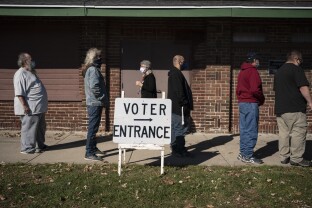Some key Wisconsin Republicans in Congress, staring down another pivotal campaign year in their swing state, are allying with a group of their state legislators in a push to disband or radically alter the agency that oversees Wisconsin’s elections.
The Wisconsin Elections Commission “is out of control. And I don’t think it should be there,” Rep. Derrick Van Orden told NOTUS.
The effort is the culmination of years of partisan squabbling over election security and supposed fraud — the trickle-down impact of messaging from national Republicans, most prominently former President Donald Trump. And it could have a substantial impact on how people vote in one of the most crucial states in this year’s elections, in both the race for the White House and control of Congress.
Nowhere is that more visible than in efforts by a group of state Republicans to remove Meagan Wolfe, the nonpartisan leader of the Wisconsin Elections Commission. Recently, state Republicans authored bills and resolutions to both impeach her and dissolve the commission entirely, transferring elections administration to Wisconsin’s secretary of state. The basis? Now-standard but debunked GOP-backed concerns about the security of the 2020 elections.
All 15 articles of the impeachment resolution, detailing various Republican complaints about Wisconsin election security and alleged violations of state law, were found to contain “misleading or false claims about how elections administration works in Wisconsin,” according to a PolitiFact review of an October bill with identical language. Wolfe’s staff also released a fact-check of the articles.
The impeachment attempt has become especially fraught in the Wisconsin State Assembly, even just among Republicans. A state representative leading the push lashed out at Republican Tyler August, the Assembly majority leader, for not swiftly backing the impeachment drive. “Our caucus is focused on real things,” August told reporters in Wisconsin last week. And in November, Assembly Speaker Robin Vos brushed off public pressure from Trump to advance the impeachment. “We need to move forward and talk about the issues that matter to most Wisconsinites and that is not, for most Wisconsinites, obsessing about Meagan Wolfe,” he said.
Vos has similarly knocked down the bill to dissolve the state elections commission, calling it “a stupid idea” that “should die a long, slow death.”
The bill on the commission’s dissolution explicitly says the secretary of state can’t take any action on administering elections without first getting approval from the elections committees in both state chambers. The Wisconsin Senate has a Republican supermajority, and the Assembly is two seats away from one. Secretary of State Sarah Godlewski is a Democrat; the commission’s board is mandated to be bipartisan.
All that isn’t even close to Wisconsin state lawmakers’ exhaustive efforts to change the election process this term.
At least 43 bills or resolutions, excluding companion bills, related to election security and voting practices more broadly have been introduced in the current legislative session. Twenty-six introduced by Republicans address a gamut of alleged security concerns and include terminating the state’s relationship with the Electronic Registration Information Center and mandating audits after general elections. The other 17, by Democrats, primarily focus on expanding voter rights.
This is a sharp change in practice. In the 2019-2020 session, state lawmakers from both parties only introduced a total of 11 such bills, not including bills specifically related to the coronavirus pandemic.
Republican state representatives attribute the new influx of legislation to their constituents’ election security concerns going back to 2020.
“I’m not saying that there were problems. But there is the perception of a great number of my constituents that thinks that there was a problem with the 2020 election,” state Rep. Karen Hurd, a Republican and a co-sponsor of the bill to dissolve the election commission, told NOTUS in an interview.
GOP state Rep. Scott Allen said, “What we really haven’t tried to do is have [elections] accountable under a new elected position.” When asked if he thought the current oversight of the commission would be the same as that proposed for the secretary of state, he said, “In my opinion, yes.” Hurd concurred but stressed she wasn’t completely sure.
State Republicans have support from their congressional delegation in Washington.
Sen. Ron Johnson told NOTUS he doesn’t “think Meagan Wolfe should remain in that position. Wisconsinites just don’t have confidence in the fairness of our elections.”
Rep. Tom Tiffany, who served in both chambers of the Wisconsin legislature and voted to establish the state election commission, said, “If [the state legislature] can find a better way, I’m certainly always willing to consider something like that.”
Tiffany said he’s “not surprised” by the increase in state Republican lawmakers’ election-related proposals: “It’s a result of when you have election improprieties, as there was in 2020,” he said.
Several legal cases in the state also could impact voting rules this fall, including a request to have the Wisconsin Supreme Court order new Congressional maps and a suit filed by a national Democratic law firm that would allow absentee ballots to be placed in drop boxes. A state judge handed down the first decision in one of those lawsuits earlier this month, ruling in favor of Republicans that Wisconsin law doesn’t allow for mobile absentee voting sites. The state elections commission had dismissed a complaint about the practice before the suit’s filing in court.
—
Nuha Dolby is a NOTUS reporter and an Allbritton Journalism Institute fellow.
Sign in
Log into your free account with your email. Don’t have one?
Check your email for a one-time code.
We sent a 4-digit code to . Enter the pin to confirm your account.
New code will be available in 1:00
Let’s try this again.
We encountered an error with the passcode sent to . Please reenter your email.


